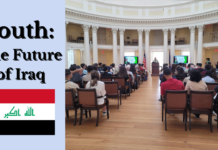Take Back the Night hosted its annual campaign this week on Grounds in efforts to “shatter the silence, and stop the violence” regarding sexual assault. Student leaders planned this week of events to help push for their goal of ending all forms of sexual and domestic violence. Events were targeted not only at survivors, but also at allies, and Wednesday night’s Open Mic Night provided a special opportunity for both of these groups to come together.

TBTN’s Open Mic was held in Bryan Hall and offered interested students the opportunity to express themselves in a medium of their choosing in a supportive space. Most performers shared poems or monologues that included painful memories of their assaults and aftermaths, as well as inspiring tales of recovery.
Fourth year student and Poetry Writing Major, Rachel Carle, was a co-chair for the event along with Pinky Hossain. Carle has co-chaired this event for all three of the semesters she spent in Charlottesville.
“When I was in high school, three different friends disclosed their assaults to me,” Carle shared. “I didn’t have the words, the education, or the community to properly support them. I felt lost in the process, and I made a lot of mistakes. When I came to UVa my first year, I was shocked and thrilled that things like Take Back the Night existed.
“There is real, student-led infrastructure to tackle this from all sides – education, prevention, and support. People are thinking critically about this complex issue and speaking up about it. That felt unprecedented given my experience in high school.”
This was a sentiment shared by many performers at Open Mic night. Many came from high schools devoid of sexual education curriculum, and did not learn about the concept of consent until their time at UVa. Others were unable to acknowledge their experiences as assault until they found themselves in a more supportive community years after the fact.
“It gives the microphone back to survivors if they want it; lets them take back a narrative that is so often dominated by news media, court records, and politicians,” said Carle in reference to this event. “We learn that sexual assault is more than a single story, it’s complex and varies by individual experience: one person wants to be called a ‘survivor,’ another feels comfortable with ‘victim.’”
The aftermath of Sabrina Rubin-Erdely and Rolling Stone’s “A Rape on Campus” article is still fresh in the minds of many students, as great attention was paid to the university to see how the issue of sexual assault would be addressed. TBTN is one of many campaigns and organizations that have answered this call of action, something they have been doing for years.
“TBTN, even before Rolling Stong, has always drawn large crowds,” said Carle. “Students have been campaigning to end sexual violence for decades and they continue to this year.”
Carle cited the main goal of TBTN as creating a supportive space for survivors and its biggest challenge as encouraging people who don’t regularly engage on this issue to attend events. She has not observed any negative backlash towards the event in her three years of involvement, but recognizes that in order to sustain a real dialogue, there will always be a risk of things getting ugly among people who disagree with each other.
“Some of the best advice I ever got was, ‘don’t just do something, sit there,’” said Carle. “TBTN is a lesson in just that – bearing witness, thinking deeply, and listening compassionately.”
















